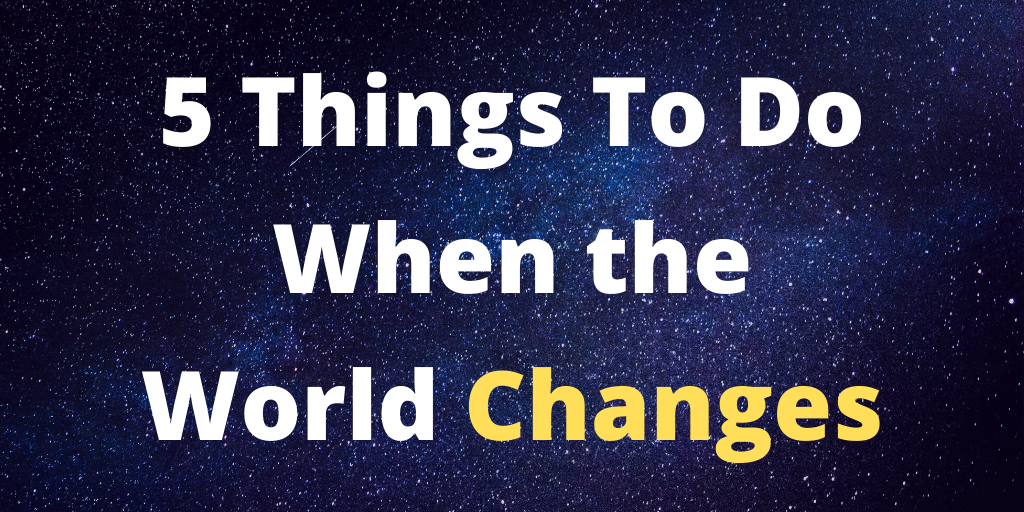5 Things To Do When the World Changes
 I don't know if you've noticed, but things may not immediately return to the way they were before COVID-19.
I don't know if you've noticed, but things may not immediately return to the way they were before COVID-19.
They may not immediately return, or quickly, or even over time.
In fact, it's probable that some things that were normal and everyday may not just pick up as if nothing happened.
Ever.
Or for a very long time.
Note: I am not an alarmist and I'm not a pessimist. I do tend toward pragmatism and the rejection of the hunt for problem-free. Deep down I am always hopeful and optimistic about the next try.
Here are 5 things to do when the world changes:
1. Establish (or reinforce) a stewardship culture.
Mourning the good ole days is natural and healthy to a degree. Wasting today's responsibilities and opportunities in the desperate attempt to return to the normal of yesterday is not likely to hear "well done."
If you want to hear, well done, work diligently to be a good steward of today's responsibilities and opportunities.
I like what Bil Keane said, "Yesterday is history, tomorrow is a mystery, today is a gift of God, which is why we call it the present."
Yesterday is history, tomorrow is a mystery, today is a gift of God, which is why we call it the present. —Bil Keane Share on X
2. Always assign results to the design being used.
This is a very important conviction. If "your ministry is perfectly designed to produce the results you are currently experiencing," and I think most of us believe that is true, the results should always be assigned to the design being used.
With me?
That means, if you don't like your results, it is time to change the design; to do some design work.
If you don't like your results, it is time to change the design; to do some design work. Share on X
3. Resist the hunt for a problem-free solution, strategy, model or system.
As we all know by now, there are no problem-free systems, models or strategies. Every system, model or strategy comes with a set of problems. Wise leaders simply choose the set of problems they'd rather have.
There are no problem-free systems, models or strategies. Every system, model or strategy comes with a set of problems. Wise leaders simply choose the set of problems they'd rather have. Share on X
4. Ask the right questions to determine the way forward.
Albert Einstein said, “If I had an hour to solve a problem and my life depended on it, I would use the first 55 minutes determining the proper question to ask, for once I know the proper question, I could solve the problem in less than five minutes.”
I've always found that the right questions makes a big difference. The right questions often leads to a trajectory shift. The right question often leads to a new and better point-of-view (and a better "point-of-view is worth 80 IQ points").
Some of the best questions are:
- What's the best way to __________________________ ?
- How might we ___________________________________ ?
- What will have to be true for the strategy on the table to be the best strategy?
If I had an hour to solve a problem and my life depended on it, I would use the first 55 minutes determining the proper question to ask, for once I know the proper question, I could solve the problem in less than five minutes. Share on X
5. Never settle for the results of the first try (test, experiment, version, etc.).
When you choose a new design to achieve the results you need, don't settle for the results of your first try. Rather, when you begin moving in a new direction, acknowledge in advance that the results of every attempt need to be evaluated afterward (right, wrong, missing and confused) and a next attempt scheduled.
When you begin moving in a new direction, acknowledge in advance that the results of every attempt need to be evaluated afterward (right, wrong, missing and confused) and a next attempt scheduled. Share on X
Further Reading:
Are You Stuck as a Result of Asking the Wrong Questions?

